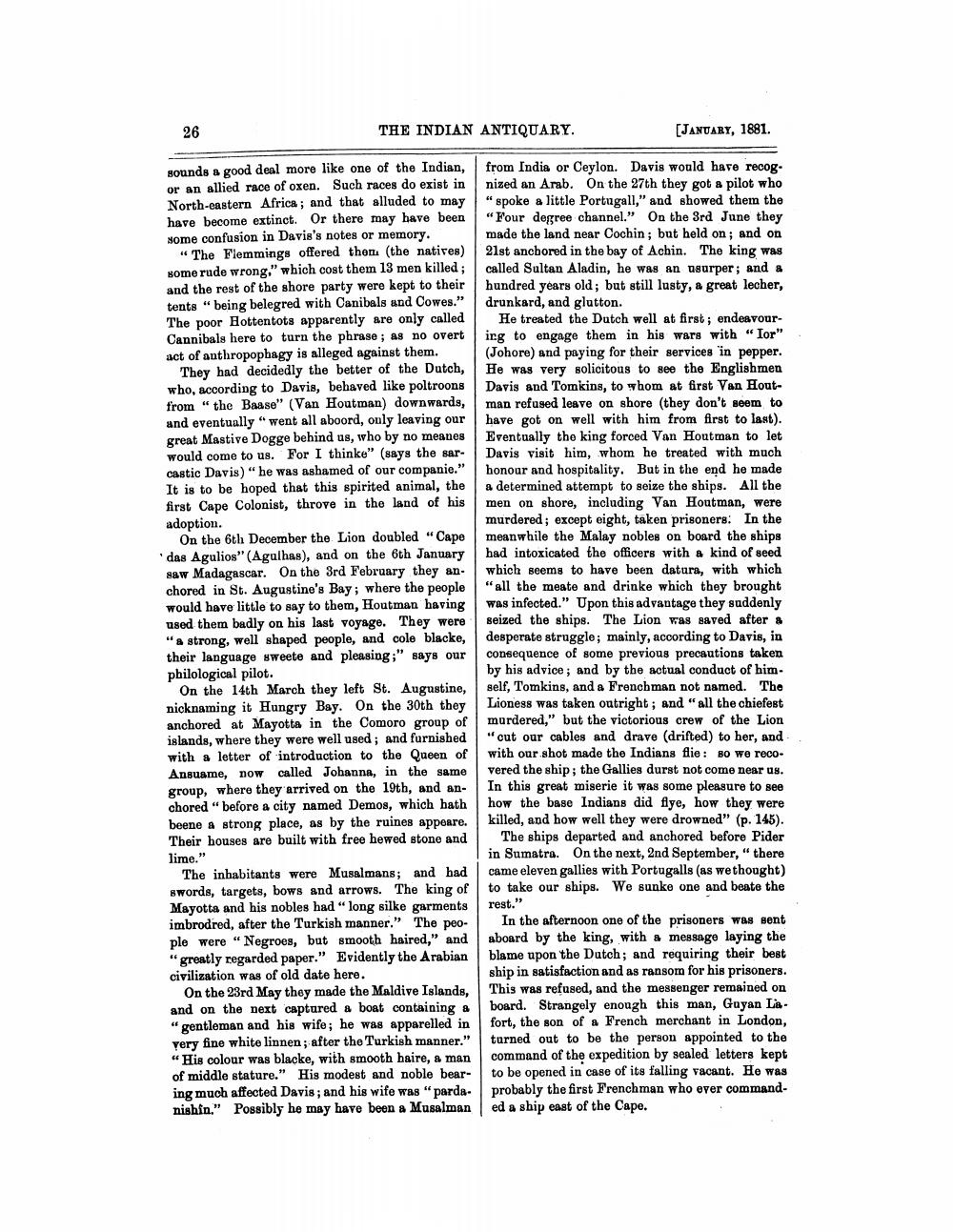________________
26
THE INDIAN ANTIQUARY.
[JANUARY, 1881.
sounds a good deal more like one of the Indian, or an allied race of oxen. Such races do exist in North.castern Africa, and that alluded to may have become extinct. Or there may have been some confusion in Davis's notes or memory.
The Flemmings offered thon (the natives) Bomo rude wrong," which cost them 13 men killed ; and the rest of the shore party were kept to their tents "being belegred with Canibals and Cowes." The poor Hottentots apparently are only called Cannibals here to turn the phrase; as no overt act of anthropophagy is alleged against them.
They had decidedly the better of the Dutch, who, according to Davis, behaved like poltroons from * the Basse" (Van Houtman) downwards, and eventually " went all aboord, only leaving our great Mastive Dogge behind us, who by no meanes would come to us. For I thinke" (says the sarcastic Davis) "he was ashamed of our companie." It is to be hoped that this spirited animal, the first Cape Colonist, throve in the land of his adoption.
On the 6th December the Lion doubled "Cape das Agulios" (Agulhas), and on the 6th January saw Madagascar. On the 3rd February they an. chored in St. Augustino's Bay; where the people would have little to say to them, Houtman having used them badly on his last voyage. They were "a strong, well shaped people, and cole blacke, their language sweete and pleasing," says our philological pilot.
On the 14th March they left St. Augustine, nicknaming it Hungry Bay. On the 30th they anchored at Mayotta in the Comoro group of islands, where they were well used; and furnished with a letter of introduction to the Queen of Ansuame, now called Johanna, in the same group, where they arrived on the 19th, and an. chored before a city named Demos, which bath beene a strong place, as by the ruines appeare. Their houses are built with free hewed stone and lime."
The inhabitants were Musalmans; and had swords, targets, bows and arrows. The king of Mayotta and his nobles had a long silke garments imbrodred, after the Turkish manner." The people were “Negroes, but smooth haired," and "greatly regarded paper." Evidently the Arabian civilization was of old date here.
On the 23rd May they made the Maldive Islands, and on the next captured a boat containing & "gentleman and his wife; he was apparelled in very fine white linnen; after the Turkish manner." " His colour was blacke, with smooth haire, a man of middle stature." His modest and noble bearing much affected Davis; and his wife was "parda. nishin." Possibly he may have been a Musalman
from India or Ceylon. Davis would have recog. nized an Arab. On the 27th they got a pilot who "spoke a little Portugall," and showed them the "Four degree channel." On the 3rd June they made the land near Cochin; but held on; and on 21st anchored in the bay of Achin. The king was called Sultan Aladin, he was an usurper; and a hundred years old; but still lusty, a great lecher, drunkard, and glutton.
He treated the Dutch well at first; endeavourirg to engage them in his wars with "Ior" (Johore) and paying for their services in pepper. He was very solicitous to see the Englishmen Davis and Tomkins, to whom at first Van Houtman refused leave on shore (they don't seem to have got on well with him from first to last). Eventually the king forced Van Houtman to let Davis visit him, whom he treated with much honour and hospitality. But in the end he made a determined attempt to seize the ships. All the men on shore, including Van Houtman, were murdered; except eight, taken prisoners. In the meanwhile the Malay nobles on board the ships had intoxicated the officers with a kind of seed which seems to have been datura, with which "all the meate and drinke which they brought was infected." Upon this advantage they suddenly seized the ships. The Lion was saved after a desperate struggle; mainly, according to Davis, in consequence of some previous precautions taken by his advice, and by the actual conduct of him. self, Tomkins, and a Frenchman not named. The Lioness was taken outright; and "all the chiefest murdered," but the victorious crew of the Lion "cut our cables and drave (drifted) to her, and with our shot made the Indians flie: BO we recovered the ship; the Gallies durst not come near us. In this great miserie it was some pleasure to see how the base Indians did flye, how they were killed, and how well they were drowned" (p. 145).
The ships departed and anchored before Pider in Sumatra. On the next, 2nd September, " there came eleven gallies with Portugalls (as wethought) to take our ships. We sunke one and beate the rest."
In the afternoon one of the prisoners was sent aboard by the king, with a message laying the blame upon the Dutch; and requiring their best ship in satisfaction and as ransom for his prisoners. This was refused, and the messenger remained on board. Strangely enough this man, Guyan L. fort, the son of a French merchant in London, turned out to be the person appointed to the command of the expedition by sealed letters kept to be opened in case of its falling vacant. Ho was probably the first Frenchman who ever commanded a ship east of the Cape.




